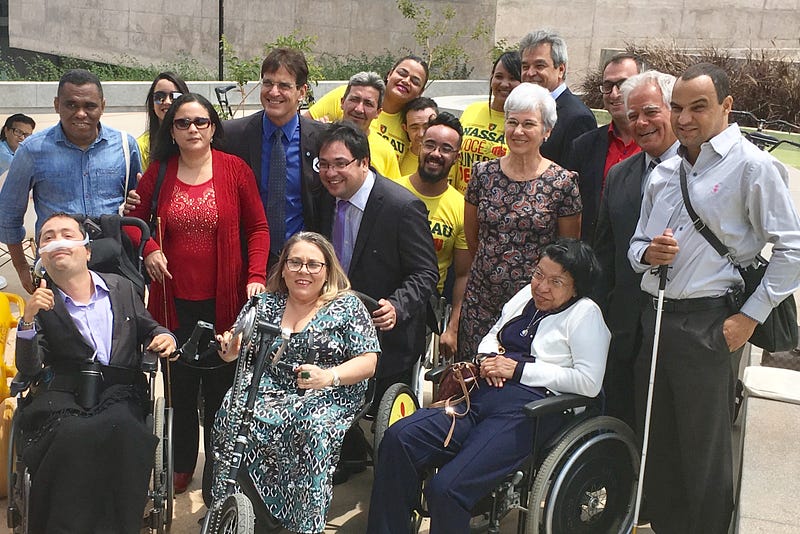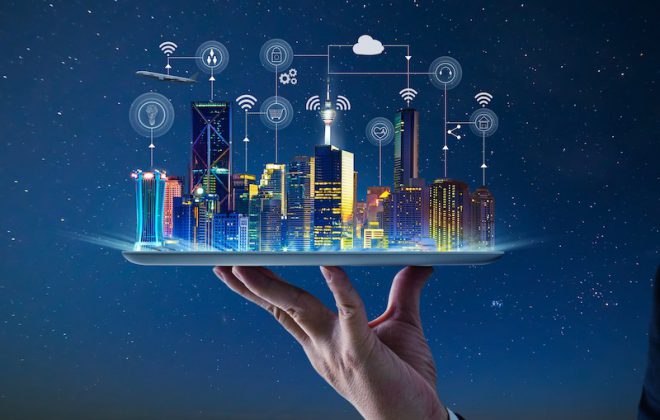Why Cities Should Build Smart, Urban and Inclusive Solutions for All


Almost two years ago, I had a phone call with James Thurston, G3ict’s Vice President for Global Strategy and Development, that would change my life. We talked through a range of global issues but quickly came to the realization that Smart Cities could either include or exclude millions of people if they did not build in accessibility features into their design. We both knew we had to do something about that, and so we joined forces, travelled the world and helped put this important topics of digital inclusion and digital accessibility on the proverbial “Smart City” map.
Now, it’s humbling to know that our Smart Cities for All global initiative will be recognized with an award during the prestigious event, Bioneers 2017 — Uprising. Bioneers is a community of leaders that are actively changing the world, and this year Smart Cities for All, a collaboration led by James Thurston at G3ict and myself at World Enabled, will spotlight the need for digital inclusion in a rapidly urbanizing world. This year’s conference also includes a focus on our innovative tool kit, and the strategies and solutions that ensure persons with disabilities and older persons have a say in how future cities are built.
As an urban planner, scholar and policy consultant I have seen firsthand how a city’s investment in technology opens a unique opportunity for the empowerment of all citizens, especially persons with disabilities and older persons. This was evident to me when I met with Raul Krauthausen in Berlin this summer. Raul is the founder of Wheelmap an online crowdsourcing platform to identify and map out accessibility of any public place in the world. Raul participates in every aspect of life in Berlin and realized that he and others who use wheelchairs would benefit from having accurate reliable information on accessibility. The tool he has built has now partnered with other crowdsourcing platforms to create accessibility cloud, a multiplatform cloud based aggregator for all accessibility data across the world. Raul demonstrates that empowered individuals (whether or not they have a disability) can leverage data and technology to change the world.
Raul and I, and many others want to make sure people with disabilities who form part of every community in the world are not left behind. That is why joining forces with the innovators at Bioneers is so important. James Thurston and I are delighted to contribute to the mission of Bioneers, and foster people and planet centered solutions that create systemic change. Smart Cities for All helps cities build smarter and more accessible cities for all. If you believe that technology can shape a more inclusive future, then I encourage you to follow some of the innovations that will be highlighted at Bioneers this week.
Joshua Fouts, Executive Director of Bioneers has also been a big ally. He recently noted that:
“the Smart Cities for All global initiative is singularly emblematic of what it means to pursue equitable, just, access to technology to all people.”
At the event, I am scheduled to deliver a keynote address touching on what it means to be human, and how my work as president of World Enabled and the Global Alliance on Accessible Technology and Environments (GAATES) has allowed me to go farther and impact more people than I ever thought possible.
In addition James Thurston and I will co-moderate a panel discussion on “Digital Inclusivity and Urban Resilience in the Global South” with experts from Microsoft, the World Institute on Disability and the California Department of Rehabilitation.
Working with G3ict to develop and launch the Smart Cities for All Toolkit has been a rewarding and impactful experience. We now have the toolkit available in English, Spanish, Portuguese, and have several additional languages are currently in development, including Hindi, Japanese, and others.
Just last month James and I were in Brasilia and Rio de Janeiro where we met with leaders working to implement digital accessibility policy at both the national and local levels. In Rio we met with city leaders who wanted to deploy the SC4A Toolkit and see the value of the tool to support a range of digital services across Rio, the “magnificent city.” Through the work we have done, it is clear that each of the tools addresses a priority challenge, and offers a solution. It is a great honor to be recognized by the Bioneers community and to also work hand in hand with global experts across the world in identifying and eliminating barriers to the digital inclusion of persons with disabilities and older persons across the world. I hope that as we advance this discussion we will continue to garner a greater commitment to digital accessibility and help shape a more inclusive future for all.
Content retrieved from: https://medium.com/@victorpineda/why-cities-should-build-smart-urban-and-inclusive-solutions-for-all-814bc5ff2850.
Upcoming Events
There are no upcoming events.


